
Sir Arthur Wing Pinero was an English playwright and, early in his career, actor.
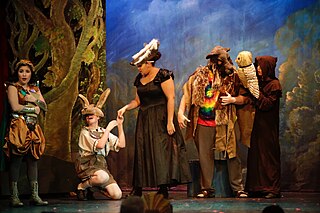
Community theatre refers to any theatrical performance made in relation to particular communities—its usage includes theatre made by, with, and for a community. It may refer to a production that is made entirely by a community with no outside help, or a collaboration between community members and professional theatre artists, or a performance made entirely by professionals that is addressed to a particular community. Community theatres range in size from small groups led by single individuals that perform in borrowed spaces to large permanent companies with well-equipped facilities of their own. Many community theatres are successful, non-profit businesses with a large active membership and, often, a full-time staff. Community theatre is often devised and may draw on popular theatrical forms, such as carnival, circus, and parades, as well as performance modes from commercial theatre. This type of theatre is ever-changing and evolving due to the influences of the community; the artistic process can often be heavily affected by the community's socioeconomic circumstances.
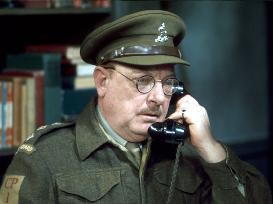
Arthur Lowe was an English actor. His acting career spanned 37 years, including starring roles in numerous theatre and television productions. He played Captain Mainwaring in the British sitcom Dad's Army from 1968 until 1977, was nominated for seven BAFTAs and became one of the most recognised faces on UK television.
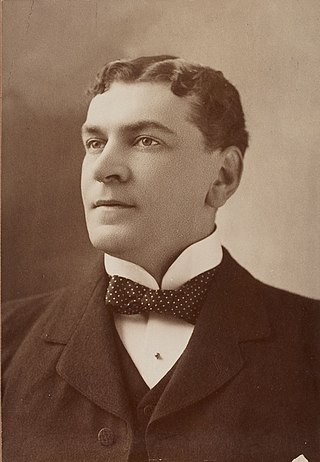
Arthur Bourchier was an English actor and theatre manager. He married and later divorced the actress Violet Vanbrugh.

Hamish MacCunn, néJames MacCunn was a Scottish composer, conductor and teacher.

Theater in the United States is part of the old European theatrical tradition and has been heavily influenced by the British theater. The central hub of the American theater scene is Manhattan, with its divisions of Broadway, Off-Broadway, and Off-Off-Broadway. Many movie and television stars have gotten their big break working in New York productions. Outside New York, many cities have professional regional or resident theater companies that produce their own seasons, with some works being produced regionally with hopes of eventually moving to New York. U.S. theater also has an active community theater culture, which relies mainly on local volunteers who may not be actively pursuing a theatrical career.

Lionel John Alexander Monckton was an English composer of musical theatre. He became Britain's most popular composer of Edwardian musical comedy in the early years of the 20th century.

Albert Chevalier ;, was an English music hall comedian, singer and musical theatre actor. He specialised in cockney related humour based on life as a costermonger in London during the Victorian era. Owing to this and his ability to write songs, he became known to his audiences as the "costers' laureate".

Henry Hinchliffe Ainley was an English actor.
The McCallie School is a boys college-preparatory school located on Missionary Ridge in Chattanooga, Tennessee, United States. The school was founded in 1905 and now has 322 boarding students in grades 9–12 and 657 day students in grades 6–12.
Pembroke Players is an amateur theatrical society in Cambridge, England, founded in 1955 and run by the students of Pembroke College, Cambridge. It is the most active College drama society in the university, staging or producing over 25 drama productions and comedy smokers every year. It is also the only College drama society to run its own international tours. During its lifetime it has been the starting point for many prominent actors and comedians, such as Clive James, Peter Cook and Eric Idle, and more recently Tom Hiddleston, Jonny Sweet and Joe Thomas. The Society celebrated its 60th birthday in 2015.

Amateur theatre, also known as amateur dramatics, is theatre performed by amateur actors and singers. Amateur theatre groups may stage plays, revues, musicals, light opera, pantomime or variety shows, and do so for the social activity as well as for aesthetic values. Productions may take place in venues ranging from the open air, community centres, or schools to independent or major professional theatres.

The Scala Theatre was a theatre in Charlotte Street, London, off Tottenham Court Road. The first theatre on the site opened in 1772; the last was demolished in 1969, after a catastrophic fire. From 1865 to 1882, the theatre was known as the Prince of Wales's Theatre.

The All-England Theatre Festival ("AETF") organises the only countrywide eliminating contest for one-act plays in performance throughout England. It provides an opportunity for Amateurs to compete against like-minded groups and to benefit from the adjudication they receive to improve the quality of their performance. The AETF also maintains contact with other leading bodies involved in Amateur Dramatics throughout the United Kingdom by means of its membership of the Central Council for Amateur Theatre, The Drama Festivals Consortium and the British Finals Standing Committee. The festival is also involved with the Geoffrey Whitworth Trophy Competition, in conjunction with the other 'Hosts' of the British Festival, to judge original unpublished scripts that are first produced within the relevant festivals.
The history of photography in Japan begins in the 19th century and has continued to be a prominent art form into the present era.
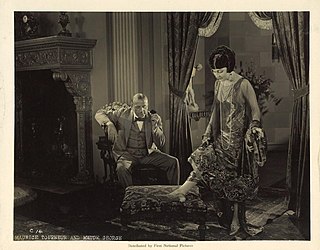
Torment is a 1924 American silent crime drama film produced and directed by Maurice Tourneur and distributed by Associated First National. This film stars Bessie Love, Owen Moore, and Jean Hersholt. The film is based on a story by William Dudley Pelley with script by Fred Myton and titles by Marion Fairfax. It is a lost film.
The Gaiety Theatre is a public hall in Naka-ku, Yokohama, Japan. It was built in 1866 by Dutch merchant MJB Noordhoek Hegt behind his office at Settlement plot 68. An amateur dramatic club was organized and performed at the public hall. Hegt rented the hall at a very reasonable price for the dramatic club's performances but it soon proved to be too small and was also being used for many other activities so, in 1870, another small theater was built on Honmachi Street and became the original Gaiety Theatre.
The history of theatrical performances in Jersey can be traced back to the 18th century. The Opera House, opened by Lillie Langtry in 1900, and the Jersey Arts Centre are the main performance spaces, although performances also take place in parish halls and other venues.
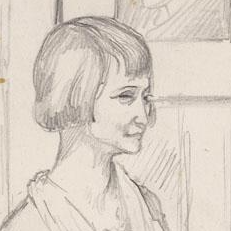
Daisy "Toto" Bannard Cogley was a French-born Irish theatre actress, director, producer and designer. A socialist, she was active in the Irish War of Independence from 1917, and was interned during the Irish Civil War. She was an active figure on Dublin's theatrical scene for decades, as well as in Wexford and for a time London, launching multiple theatre and cabaret studios, and she was a co-founder of one of Dublin's main theatres, the Gate, of which she remained a director from 1928 to her death.













